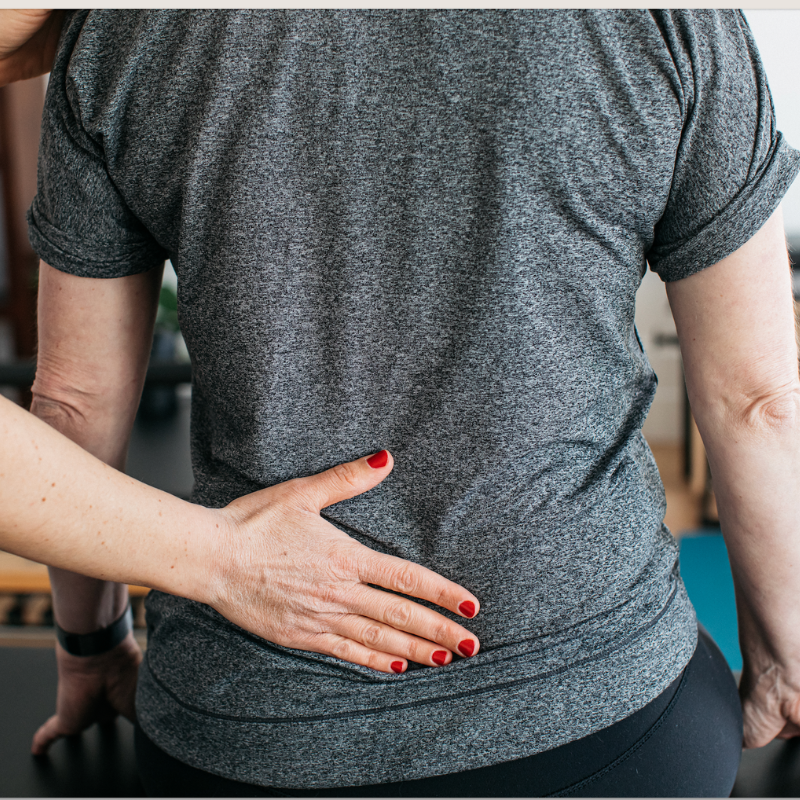Osteopath for Lower Back Pain
At Wellthy Clinic, our experienced osteopaths specialise in treating back pain, especially lower back pain. We take the time to explain the root cause of your pain, provide effective hands-on osteopathic treatment, offer personalised stretching and strengthening exercises, and give you nutritional and hydration advice to support your recovery.
Osteopath for Lower Back Pain
Lower back pain (LBP) is a condition that causes a great deal of pain and suffering worldwide. It also accounts for significant societal costs due to healthcare spending and missed work (Cochrane 2014). LBP is prevalent in the adult population, affecting up to 80% of all adults sometime in their lifetimes. Moreover, LBP is typically divided into acute (less than 12 weeks) or chronic (more than 12 weeks). In most acute cases, acute symptoms resolve within a few weeks to a few months. Your lower back (lumbar spine) is the region between your lowest ribs and the upper part of the buttocks. It’s best to take steps to help manage your lower back pain; otherwise, it could develop into osteoarthritis or sciatic nerve pain.
Reasons for Lower Back Pain
The most common reasons for feeling LBP are prolonged sitting at your desk, a lack of exercise, lifting items incorrectly, and injuries. These can add mechanical load to your lower back and strain your muscles, ligaments, and joints. In addition, movements typically make it worse, and resting will help ease your tensions.
Why is my Lower Back Worse in the Morning?
It is normal for your LBP to feel worse first thing in the morning; this is a normal inflammatory picture. Inflammation is your body’s response to injury or insult, and when you are sleeping, the body sees this as a good opportunity to heal. Therefore, you feel worse first thing in the morning as this process is still finishing, but after you get up, have breakfast and a shower, your symptoms should become a little easier. Typically, as you head in the right direction, the pain level will reduce or you experience the symptoms for less time, which is a good sign. Of course, if there is no improvement in your symptoms, see our osteopath.
How Do I Know if My Bed is Causing Back Pain?
It is essential to address your mattress and pillows as if these are old (more than 8 years old) and need changing; this will not help. Typically, we suggest a relatively firm pillow which keeps your head in the midline (same line as your sternum) if you are lying on your side. Ideally, not a thin pillow that you head is sidebending on, or a giant pillow that your head is sidebending the other way. In addition, as for mattresses, we prefer pocket sprung mattresses, which are relatively firm and support your spinal curves whilst you sleep. Ideally, not really soft mattresses that your body sinks into, and gives no support.
How Do I Know if My Back Pain is Serious?
LBP can also result from other underlying conditions, such as your lower back. These could be from your kidneys, digestive system and reproductive system, to name a few. Typically, you will experience constant pain, and rest doesn’t necessarily help ease your tensions. In this case, seek advice from your GP.
How is Lower Back Pain Diagnosed?
It’s not necessary to see your GP to get an LBP diagnosis. Manual therapists (Osteopaths, physiotherapists, or chiropractors) can diagnose low back pain more specifically. They will take a full case history and perform a physical examination with testing. They will give you a diagnosis so you understand the cause of your pain and can proceed with treatment.
Lower Back Pain Treatment Options
There are many treatment options available, and it is up to the individual to make an informed choice as to which avenue they wish to pursue. The length of treatment depends on the cause of your LBP, your body’s ability to heal, and your adherence to professional advice and exercises. One option is posture rehabilitation.
Self-management
In some cases, where the pain is acute and not preventing you from performing your daily tasks, it is possible to self-manage their symptoms. Making positive lifestyle changes, reducing stress and having the right balance between resting and exercise would be beneficial. Have a well-balanced diet with good hydration and nutrition, and lose weight. Furthermore, reducing alcohol consumption and stopping smoking should all help with your recovery.
Acute Lower Back Pain Manual Therapy
The NICE low back pain guidelines (2016) suggest manual therapy for managing acute LBP within a treatment package, which includes exercise with or without psychological therapy.
Chronic LBP Multi-Disciplinary Treatment
Patients with chronic LBP receiving multidisciplinary treatments experience less pain and disability than those receiving usual care or physical treatment (Cochrane 2017). A combined physical and psychological programme incorporating a cognitive behavioural approach for people with persistent LBP was beneficial. If an individual is feeling anxious or depressed, this will increase a person’s perception of pain. Factors associated with chronic LBP are job dissatisfaction, depression and fear avoidance behaviour. Therefore, addressing how you think and feel about your back pain and introducing pain management strategies can help with symptom control.
Is Osteopathy Good for Lower Back Pain?
Yes, you will gain hands-on treatment to reduce pressure on your lower back. Our Osteopath will address the whole posture to move other areas more freely (typically osteopath for shoulder pain, osteopath for knee pain and osteopath for hip pain) to optimise the body’s natural healing processes. Our osteopaths will use a combination of muscular stretching, joint articulations and joint manipulations techniques (only when appropriate) to increase movement and reduce pain. Gentle Cranial Osteopathy techniques are also beneficial, particularly when working with patients who are experiencing a lot of pain, to calm down the system. Furthermore, you will be advised on how best to self-manage your symptoms. Be given both muscular stretching and strengthening exercises and basic nutrition and hydration advice.
Do Osteopaths Crack Your Back?
Yes, Osteopaths can manipulate your joints, but only with your consent after taking a full case history. Only if we feel the technique is appropriate for you, at the time with your presenting problem. We are not breaking your bones and not putting joints back into place. If you hear a click or pop when an osteopath manipulates your joints, gas is leaving the joint capsule. It is a safe technique for the right person at the right time. There is a slight chance you may feel sore or feel worse the following day after a treatment, but then you should feel better. This will be discussed further within treatments. There are plenty of patients we never manipulate but articulate the joints instead, which is an alternative technique that still produces good results. Another gentle option we offer is Cranial Osteopathy for lower back pain.
What Happens at your First Osteopath Appointment?
During your first consultation, a full case history will be taken to understand you. Then, your presenting problem/s and current health situation will be discussed.
We will then assess your posture and ask you to perform some active movements. After that, we will assess your joint ranges of motion passively and maybe perform some other tests. Moreover, you will be given an explanation of what is happening. Then, we will discuss your treatment options and agree with you on the type of treatment most suitable for your symptoms.
Can Osteopathy Make Back Pain Worse?
It is common to feel worse before you feel better after treatment. The Osteopath will explain the potential side effects before providing treatment and then ask for your consent before going ahead with treatment.
How do you Fix Lower Back Pain?
In some cases, where the pain is acute and not preventing you from performing your daily tasks, it is possible to self-manage your symptoms. Making positive lifestyle changes, reducing stress and having the right balance between resting and exercise would be beneficial. Have a well-balanced diet with good hydration and nutrition, and lose weight. Furthermore, reducing alcohol consumption and stopping smoking should all help with your recovery.
How Long will it Take to Recover?
From an osteopath's perspective, the prognosis for patients with acute low back pain is 3-6 weeks. Patients with chronic lower back pain may take longer to recover, depending on the individual. However, in both cases, having a structured rehabilitation plan to enable you to take control of your tensions would be worthwhile.
What is the Best Medication for Lower Back Pain?
If you choose to see your GP, they may prescribe medications to help reduce your pain. These can be oral non-steroidal anti-inflammatory drugs (NSAIDs), prescribed with or without gastroprotective medication. Weak opioids (with or without paracetamol) only if an NSAID is not suitable or has been previously ineffective (NICE 2016).
Surgical options
NICE (2016) guidelines suggest that radiofrequency denervation for people with chronic low back pain could be considered if non-surgical treatment has not worked. NICE have recommended not to use electrotherapies: ultrasound, electrical nerve stimulation (PENS) and transcutaneous electrical nerve stimulation (TENS). Moreover, interferential therapy, acupuncture or orthotics for managing low back pain, as there is a lack of evidence to support the effectiveness of these treatments.
Exercises for Lower Back Pain
Appropriate exercise is encouraged, considering people’s specific needs, preferences, and capabilities. Group exercise programmes for people with LBP were beneficial in clinical settings (NICE 2016). Therefore, Pilates is a safe, effective exercise method for people with low back pain. Please see the video below. For further videos, follow us on our Wellthy Clinic Instagram and Facebook pages.
Nutrition for Back Pain
Nutrition can also help optimise your recovery. Please learn how by speaking to our nutritionist about joint pain, gut health, and musculoskeletal health. We offer a free 15-minute discovery call to talk about your situation and your options.
Why Choose Wellthy Clinic for Back Pain?
At Wellthy Clinic, we take a genuinely holistic approach to back pain treatment. Our highly qualified osteopaths are not only experienced in hands-on techniques for relieving pain, but also integrate movement rehabilitation and evidence-based nutritional advice to support long-term recovery. Whether your back pain is acute or chronic, we tailor your treatment plan to address the root cause, not just the symptoms. Located in central London, our light-filled boutique clinic offers a calm and supportive environment where you’ll feel heard, understood, and cared for. If you're looking for an experienced and compassionate osteopath for back pain, we're here to help you move and feel better.
Frequently Asked Questions
Is an osteopath good for lower back pain? Osteopaths are trained to assess, diagnose, and treat musculoskeletal issues like lower back pain through hands-on techniques, movement advice, and lifestyle guidance. Many patients experience significant relief and improved mobility after osteopathic treatment.
Should I see a physio or osteopath? Musculoskeletal physiotherapists often focus on exercise rehab, while osteopaths integrate hands-on techniques with holistic care. Your choice may depend on whether you prefer manual therapy, lifestyle guidance, or exercise-focused rehabilitation.
Is osteopathy better than massage? Osteopathy offers a more clinical and diagnostic approach than massage, often addressing the root causes of pain. Massage may help relax muscles temporarily, but osteopathy can improve function and alignment in the long term.
Is it better to stretch or rest a sore back? Gentle movement and stretching are usually better than prolonged rest for lower back pain, unless there's an acute injury. Inactivity can worsen stiffness and delay recovery.
What not to do when your lower back hurts? Avoid heavy lifting, prolonged sitting, and sudden twisting movements. Staying still for too long can also worsen symptoms.
Should I stretch my lower back if it hurts? Gentle, pain-free stretching can help, but forcing a stretch may aggravate inflammation. It’s best to get tailored advice from a professional like an osteopath.
How do osteopathy patients treat low back pain? Osteopathic patients often receive manual therapy, exercise advice, and lifestyle changes. Treatment is bespoke based on the individual’s needs.
Why does my back pain radiate around my waist? This can be due to referral from deep muscles, nerves, or joint dysfunctions in the lumbar spine or pelvis. An osteopath can help identify and treat the source of the radiating pain.
Is walking good for lower back pain? Yes, walking helps keep the spine mobile and promotes blood flow, which supports healing. It’s one of the most recommended low-impact activities for managing back pain.
References
Cochrane Library (2014) Multidisciplinary treatment for LBP
Cochrane Library (2017) Multidisciplinary treatment at the early stages of LBP
Yamato et al (2015) Cochrane review: Pilates for low back pain
Cochrane (2017) The impact of individual recovery expectations on pain, limitations in activities, and return to work in LBP
NICE guideline NG59 (2016) LBP and sciatica in over 16s: assessment and management
Matthew Glithero is an Osteopath (MOsT), Cranial Osteopath &, Pilates instructor with a background in Sports Science (BSc).
Matthew is a dynamic Osteopath who delivers bespoke treatments aimed to reducing pain. Helping you feel better and empowering you to pro-actively manage your own symptoms.









